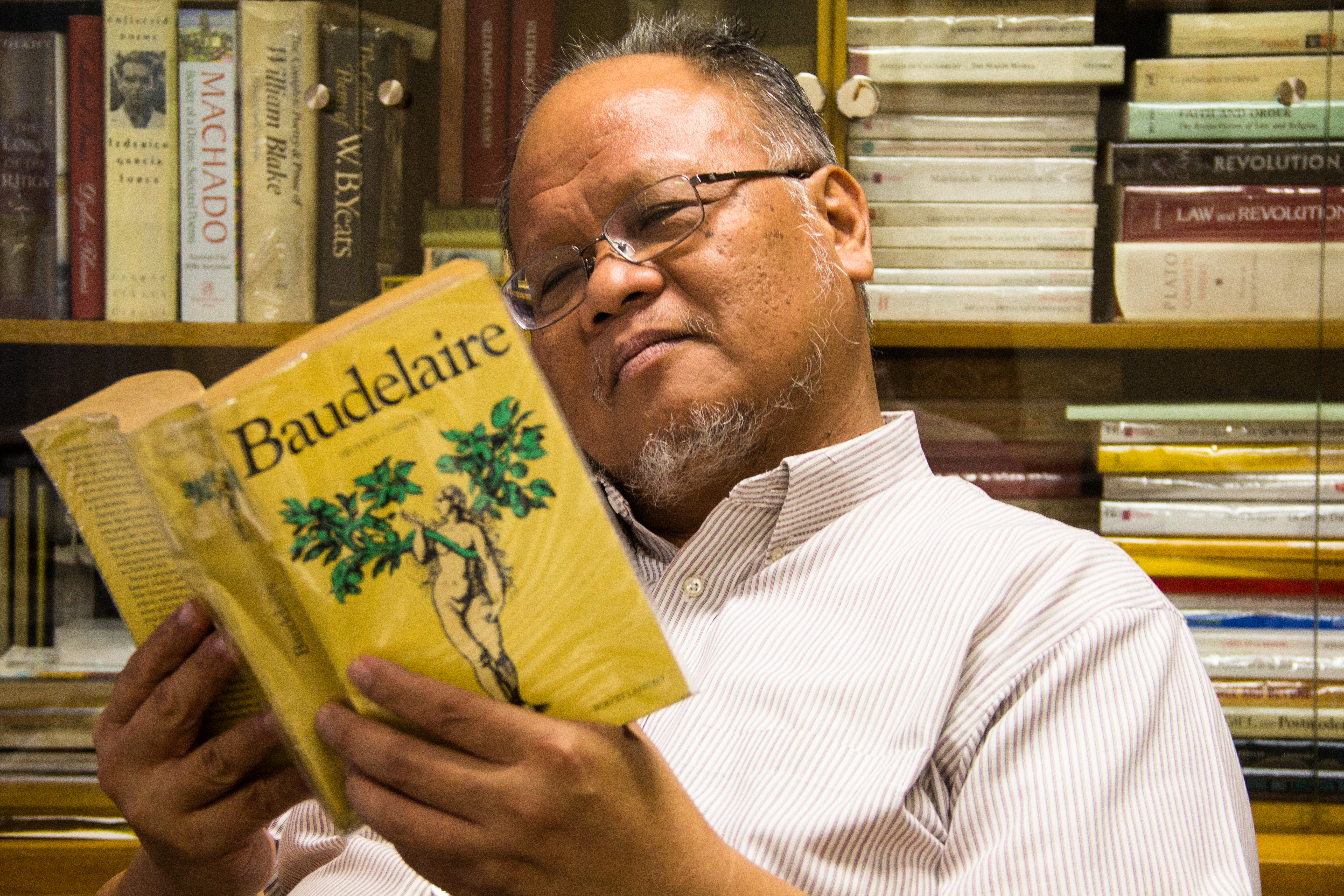With both film viewing and filmmaking made a lot easier through technology, the world of movies has had even more to offer in the 2010s. We talked to a trio of film aficionados–a Philosophy professor, a management consultant, and a film club president–to learn more about the diverse narratives of the last decade’s cinema.
Baby Boomer: Eduardo Calasanz, PhM
Eduardo Calasanz is an Assistant Professor of Philosophy at Ateneo De Manila University.
Age?
I was born in 1955.
What are your favorite films?
Ingmar Bergman: The Seventh Seal (1957), Virgin Spring (1960), Wild Strawberries (1957), Winter Light (1963). O mga pelikula ni Kurosawa tulad ng (or the movies of Kurosawa like) Ran (1985), Rashomon (1950). Para sa akin ito yung mga pelikulang nagtatanong nga mga tunay na tanong (For me, these are the films that truly ask the right questions).
Meron akong dalawang pelikula na, para sa akin talaga malapit sa aking puso, yung una yung (There are two films that are really close to my heart, the first one is) La Strada (1954) ni [Federico] Fellini at yung pangalawa yung (the second one is) Babette's Feast (1987) ni Gabriel Axel.

DVDs, hard drives, and streaming services make watching movies a no-sweat task today. This paints a stark contrast to the way films were viewed while Eduardo Calasanz was growing up. Back then, the arthouse films he yearned for were rarely screened in Hollywood-dominated Philippine cinemas. There was none of the compact goodness of the DVD. When he came back from the United States, Calasanz recalls finding copies of Akira Kurosawa and Ingmar Bergman films when he went on a trip to Quiapo–noting that until then, he could only catch the latter at film festivals.
Because of what he refers to as the “democratization of access,” most would now find it easier to watch movies across different genres, which then come with a wider range of narratives. While some of these are easily forgotten amid their many contemporaries, other films surpass their periods’ sensibilities. “‘Yung mga tunay na tanong hindi mo mapapako sa isang partikular na panahon (The right questions cannot be pinned to a particular period),” he explains.
Asked which movies of the 2010s exemplify this, Calasanz cites black-and-white Academy Award-winning film Roma (2018), alongside Hirokazu Kore-eda’s Shoplifters (2018), and Bong Joon-ho’s Parasite (2019). He points out that “class consciousness” has become a prominent theme in Latin American and Asian cinema. For Roma, “Ito'y isang paksa na sa aking palagay napaka-apit sa atin sapagkat ‘yung yaya talagang institusyon sa ating lipunan (This is a topic that is very close to us because helpers are an institution in our society),” Calasanz says.
The two Palme d’Or winners Shoplifters and Parasite are also clear examples of the Asian perspective on class consciousness. For Calasanz, the former focuses more on the meaning of family alongside a portrait of social hierarchy. On the other hand, Parasite angles class consciousness into the relations and interaction of the different classes with side notes on family.
As the film world opens up through more channels, Calasanz hopes that it also opens up to exploring important issues such as overseas Filipino workers’ narrative and the refugee crisis. And because the silver screen’s reach has gone so far to include different parts of the world, we can only look forward to Calasanz’ wish coming true in this new decade.
Millennial: Deany Cheng
Deany Cheng is a junior associate at a management consulting firm.
Age?
23 years old.
What are your favorite films?
Nashville (1975), Yi Yi (2000), Before trilogy (1995/2004/2013), Broadcast News (1987), Lady Bird (2017), The Apartment (1960), Frances Ha (2012), Certified Copy (2010), Taxi Driver (1976), Inside Llewyn Davis (2013).
Locally, my favorites are Insiang (1976), Maynila: Sa Mga Kuko Ng Liwanag (1975), and Cleaners (2019).
Who are your favorite actors and actresses?
Julie Delphy, Greta Gerwig, Ethan Hawke, Jack Lemmon, Tony Leung, Toshiro Mifune, Bill Murray, Saoirse Ronan, Barbara Stanwyck, and Lily Tomlin.

The 2010s were unquestionably tumultuous. As younger generations propel modern beliefs and social media serves as a platform for various discussions, the decade’s cinema has the same frenetic energy. And so, film enthusiast Deany Cheng delves further into the complex themes explored in this decade: “Dread, anxiety, [and] the evolving social contract in an age that finds us simultaneously becoming more connected to and isolated from each other due to capitalism and social media,” he says.
With this, Cheng lists several films that somehow illustrate what it’s like to live in this “very anxious decade.” He cites First Reformed (2017) as a film that touches on climate change dread or eco-anxiety. Similar fears also manifest due to the ever-ubiquitous social media, as in the films Eighth Grade (2018) and its local counterpart John Denver Trending (2019). Two Days, One Night (2014) then deals with the gnawing effects of capitalism on human relationships. Finally, Cheng shares his “personal choice” Frances Ha (2012) as the best illustration of being a millennial: “It is also about the ways in which our human quest for self-actualization often butts against the realities of the world we live in.”
Frances Ha aside, the 2010 millennial experience can hardly be memorialized in a single film. “The cinema that came up when we came of age,” Cheng notes, “As well as the surrounding discourse facilitated by forums, blogs, and social media, is so multifaceted.” This discourse has allowed certain sectors to see themselves onscreen more often, with Moonlight (2016), Lady Bird (2017), and Carol (2015) as shining examples of the LGBTQIA+ community and female representation. Cheng also mentions the independent films Pariah (2011), an African American girl’s story of sexual exploration, and An Elephant Sitting Still (2018), a Chinese directorial debut on four wayward individuals. Had they been made several years back, before the era of streaming, these films would likely be tucked in obscurity. To Cheng, these are testaments that even non-mainstream films–given powerful narratives and artistic portrayals–can now find footing in international cinema.
But there is more work to be done. Cheng notes that despite the accessibility of films today, blockbusters, franchises, and streaming services still overshadow mid to low-budget films that bring up important themes. However, with the film industry expanding, one can still hope for more colorful cinema. “Cinema, like any medium, is always interrogating itself, across genres and decades, constantly evolving,” Cheng says. “Any great film from a unique voice furthers that. In this age of intellectual property, let’s bring that back.”
Generation Z: Andie Bernas
Andie Bernas is the president of the Loyola Film Circle.
Age?
21.
What are your favorite films?
Internationally, I like Lady Bird (2017), In the Mood for Love (2000), and Parasite (2019). And then, locally, I really liked Gusto Kita With All My Hypothalamus (2018), and Hello, Love, Goodbye (2019).
Who are your favorite actors and actresses?
Kathryn Bernardo and Timothée Chalamet.

How, then, does diversity translate in the local film scene? Loyola Film Circle President Andie Bernas zooms in on how Philippine productions have tried to bridge the gap between mainstream and independent films. Her example: Prime Cruz’s Isa Pa With Feelings (2019). The romantic flick brings together Carlo Aquino and Maine Mendoza as a couple though they aren’t one of the country’s major love teams, all while touching on the experiences of persons with disabilities. In the same way, Cathy Garcia-Molina’s Hello, Love, Goodbye (2019) casts big stars Kathryn Bernardo and Alden Richards in a film that packs feminist undertones. However, beyond individual films, industry authorities and big companies have also been trying to innovate Philippine cinema.
What comes to mind is the 2016 Metro Manila Film Festival (MMFF), which spurred discussions for its unconventional lineup of entries. The 2016 MMFF films drew nearer to independent movies like the OFW documentary Sunday Beauty Queen (2016) and the animated feature Saving Sally (2016),while snubbing mainstream franchises like Enteng Kabisote (2004) and Shake, Rattle, & Roll (1984). ABS-CBN also created Black Sheep productions in 2018 as an alternative, millennial-focused film arm to venture beyond sister-company Star Cinema’s family-centric, emotional storylines. With films like That Thing Called Tadhana (2014), Exes Baggage (2018) and Alone, Together (2019) that get creative with the romcom genre, Black Sheep stays true to its proclamation of being the “home of fresh and fearless films meant to be seen and ‘herd.’”
But even mainstream production companies like Star Cinema are trying to deviate from their usual content. The company has even started exploring other themes with their horror film Hellcome Home (2019), which sheds some light on the farmers’ crisis in the country. Bernas is glad to “see these films tackle deeper topics.” She points out that even romcoms now have more creative plotlines, like those of the aforementioned Isa Pa With Feelings and Hello, Love, Goodbye. “I’m witnessing so much more discussions online, so much ‘wokeness’,” she adds. Bernas sees our generation tuning into constant updates about politics and society, that we now gravitate towards material centered on these themes.
This shift likewise speaks of filmmakers trusting Filipino audiences more. “Before, the reason was always that [audiences] won't understand the [storyline],” Bernas says,“[but as filmmakers] you shouldn't dumb things down for the audience.” Thankfully, now with big names alongside fresher plots, film houses will still get to attract moviegoers while engaging them in discourse. This is perfect for Generation Z, which Andie observes as more critical of political correctness and accuracy. These recent developments have Bernas positive that there’s more to come from Philippine cinema.
Across different generations, this decade of film has definitely become more diverse in its themes, whether in the local and international scene. With more avenues for its viewers, the film industry has also opened up to a wider audience. And like Calasanz, Bernas, and Cheng, we can only hope that cinema will only continue to introduce new themes, accommodating more voices and reaching out to more people one flick at a time.
Photos courtesy of our interviewees
Graphic by Tan Yu Ling Fabro